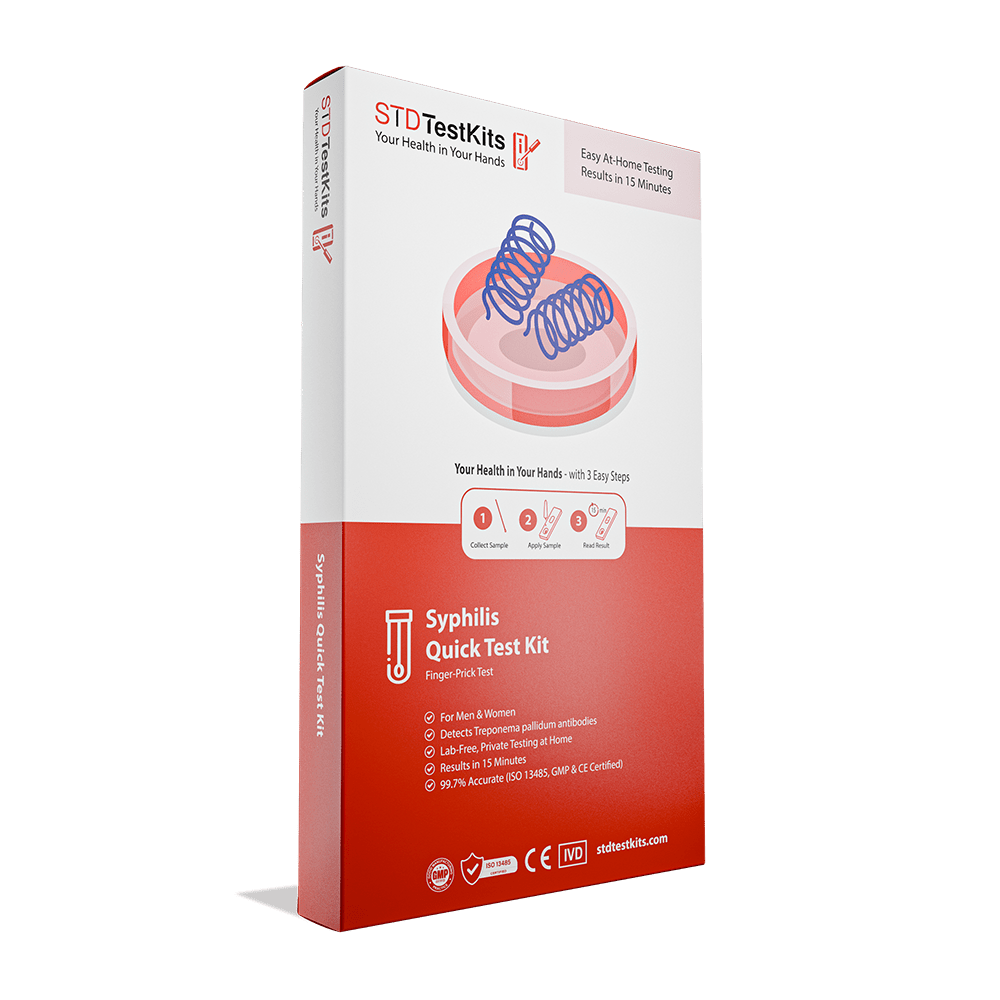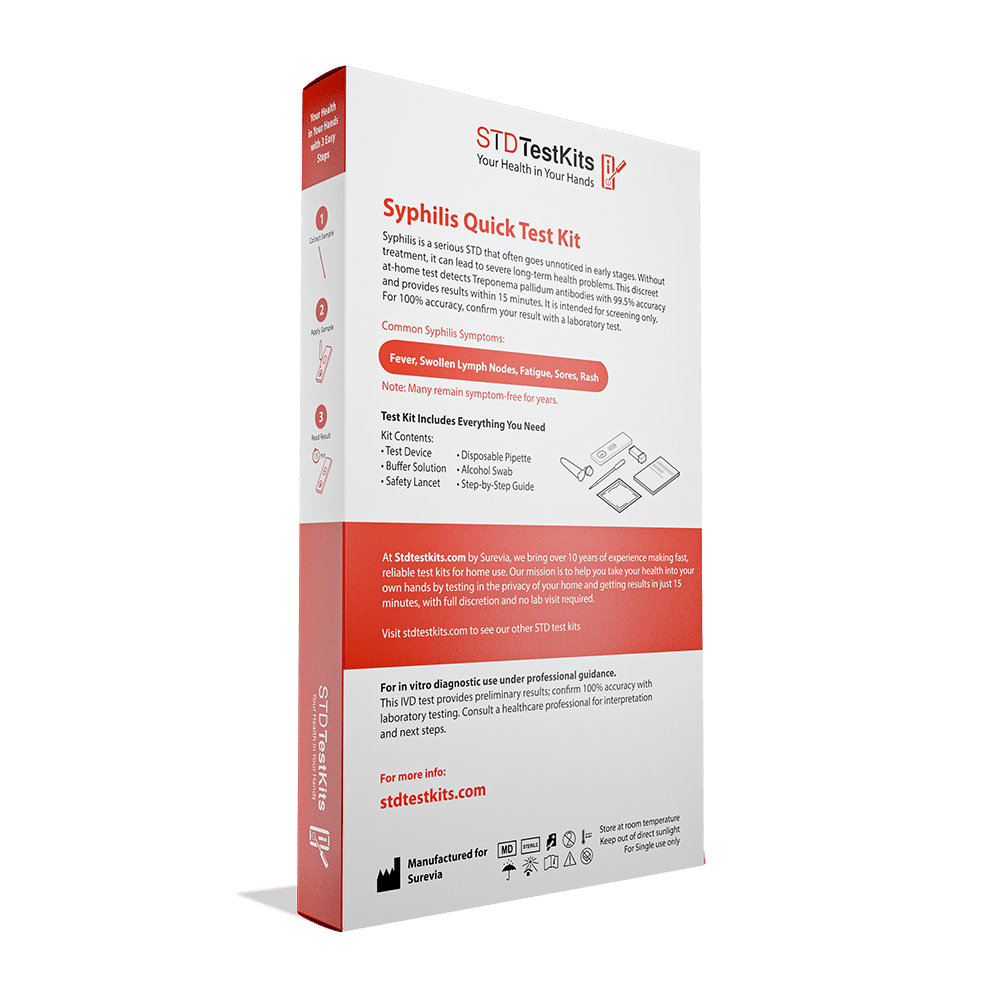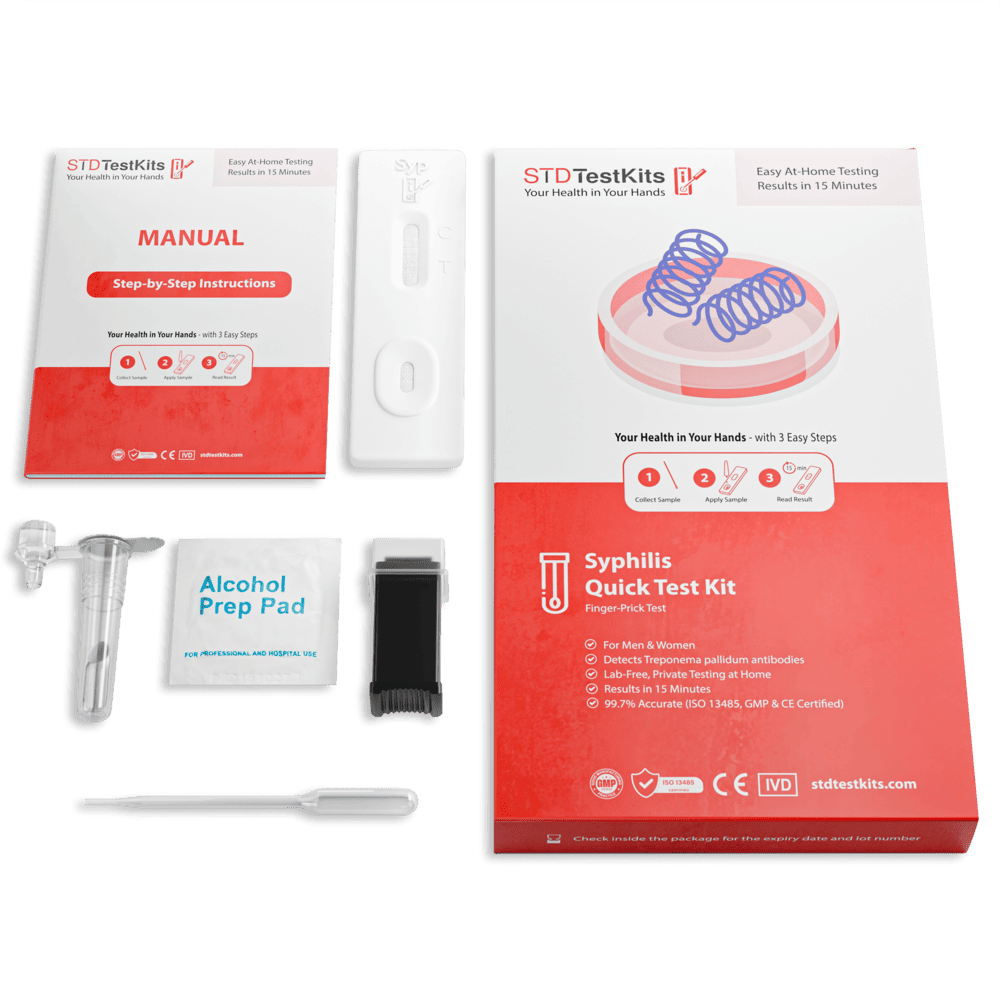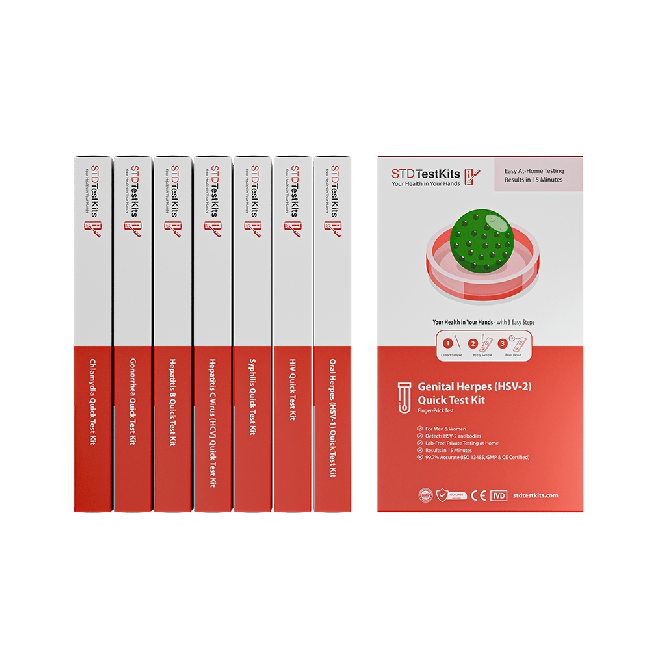Syphilis is a bacterial STI caused by Treponema pallidum. Often dubbed “the great imitator,” syphilis can affect many parts of the body and symptoms come in stages that mimic other illnesses. Many people with syphilis have no symptoms or don’t recognize them – the infection can go unnoticed and lie latent for years. Syphilis usually starts with a single painless sore (chancre), then a rash, and if untreated, can progress to severe damage of the heart, brain, and other organs in its late stage. Early diagnosis is crucial, as syphilis is curable with antibiotics, but untreated syphilis can cause irreversible complications (and can be passed from mother to child during pregnancy, leading to congenital syphilis).
Our Syphilis At-Home Test Kit allows you to detect syphilis easily and privately. It uses a finger-prick blood sample to check for syphilis antibodies (Treponemal antibodies) with 99%+ accuracy. You get a clear result in about 15 minutes. This one-step rapid test is as reliable as clinic tests, but you skip the office visit. The kit is fully certified (ISO 13485, CE) and comes in discreet packaging. Regain control of your health by testing for syphilis at home—early detection means a simple cure before any damage is done.
Symptoms & Complications
-
Asymptomatic: Most infections are asymptomatic or have symptoms so mild they go unnoticed. You may carry syphilis without knowing it, especially in the latent stage where there are no symptoms at all.
-
Mild: In the primary stage, a firm, round, and painless sore (chancre) appears at the site of infection (genitals, anus, mouth) and then heals on its own. In the secondary stage, you might get a non-itchy skin rash (often on palms of hands or soles of feet), fever, swollen lymph nodes, sore throat, patchy hair loss, or fatigue. These symptoms may be mild and resolve without treatment.
-
Severe: In tertiary (late) syphilis, which occurs years after infection if untreated, the bacteria can cause serious damage throughout the body. This can include gummas (soft, tumor-like growths), damage to the heart and blood vessels (e.g., aneurysms), and neurosyphilis – infection of the brain and spinal cord. Severe consequences are paralysis, numbness, blindness, dementia, and heart failure. Syphilis in its late stage can be life-threatening and cause permanent disabilities.
-
Untreated Risks: Long-term untreated syphilis can be devastating. It can last for many years and lead to brain and nerve damage, heart disease, blindness, or paralysis. Syphilis also significantly increases the risk of contracting or transmitting HIV. Furthermore, syphilis in pregnancy can result in miscarriage, stillbirth, or congenital syphilis in the baby. Congenital syphilis can cause deformities, neurological issues, or infant death, which is why testing and treating syphilis early is so critical.
Early & Repeat Testing Recommended
-
Window Period Testing: Syphilis antibodies may take a few weeks to become detectable. If you think you were exposed, you should test initially at around 3-4 weeks after exposure (or any time you notice a suspicious sore). Early testing can catch many cases, but very recent infections (under 2 weeks) might not show up yet.
-
Confirmatory Test: Retest about 6 weeks to 3 months after the exposure or after a negative early test, because antibodies to syphilis often reach detectable levels by that time if an infection was present. Also, if you receive treatment for syphilis, follow up with another test in a few months to ensure the infection is cured (your healthcare provider may perform specific follow-up tests).
Partner Testing Encouraged: If you have syphilis, all sexual partners should be notified, tested, and treated. Syphilis is highly contagious during its early stages, and partners may be infected without knowing. By encouraging your partner(s) to get tested, you protect their health and prevent reinfection. Many public health departments offer confidential partner notification services that can help with this process.
How It Works
-
Collect Sample: Use the provided lancet (small finger-prick device) to prick your fingertip and collect a drop of blood using the included dropper or pipette. The kit includes everything needed, and the process is similar to checking blood sugar – quick and relatively painless.
-
Apply & Wait: Add your blood drop to the test cassette’s sample well, then add the provided test buffer solution. The test begins to run – you’ll wait about 10–15 minutes.
-
Read Results: The test cassette will display a control line and a test line. After 15 minutes, check the markings: a control line plus a test line means the presence of syphilis antibodies (a positive result), while a control line alone means a negative result. (Specific illustrations in the instructions will show how a positive/negative looks.) If no control line appears, the test is invalid and should be repeated with a new kit.
Don’t let syphilis stay hidden – with our Syphilis At-Home Test Kit, you can detect this infection early from the privacy of your home. Early treatment can cure syphilis completely. Order a kit today for yourself (and one for your partner), and ensure that this curable infection doesn’t cause any harm to your health or future.






















